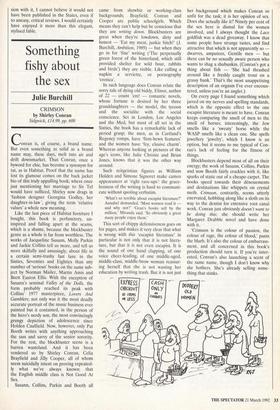Make me immoral with a kiss
Harriet Waugh
FAUSTINE by Emma Tennant Faber, £1 3.99, pp.140 Emma Tennant's Faustine is the second novel to appear in as many weeks about selling one's soul to the devil. Growing Rich, by Fay Weldon, was the other. Both explore the subject from the female angle, with Miss Tennant seeming to conclude, unfashionably, that a woman's place should be in the home and that the current desire of women to be powerful, rich, beautiful and eternally youthful arises from the correct but perverted perception that in middle age their lives are that of useless, sexless non-persons.
Faustine is about the quest of a grand-
daughter for her grandmother. Ella, aged 26, has been deprived of her emotional past. In wishing to find her grandmother, Muriel Twyman, she hopes, metaphorical- ly, to curl up once again on her lap and suck her fingers. Inside herself, Ella is still three, the age at which she last saw Muriel, who cooked cakes and read her stories and was the only loving figure in her childhood. Her mother, Anna, a feminist book pub- lisher, found more important things to do than look after her daughter. Ella has never forgiven her for parting her from her beloved grandmother and sending her out to Australia to be brought up by distant relations. Because of this fractured child- hood, Ella has no emotional life, so that when she returns to England and starts looking for Muriel in Salisbury, an awful lot hinges on their reunion.
Although the novel leads to this meeting, one never really discovers what Ella makes of it (except a recognition that they are two halves of an apple). My guess is that she probably goes mad, for Muriel, it tran- spires, was never quite the uncomplicated, loving figure of Ella's memory, even when she was making cakes and reading her stories. Instead, she was a discontented, middle-aged woman who inside her discontent loved Ella but, when given a chance of selling her soul for 25 years of renewed youth, glowing beauty, fame and fortune, did so without a backward glance. Altogether, the plot seems far more Fay Weldon-like than that of Growing Rich.
Although it gains interest as it speeds towards the end, Faustine is a disappoint- ment. Instead of treating the story natural- istically, Emma Tennant has written a fable. Perhaps she felt that the devil was too mediaeval a concept to be a convincing catalyst in modern life. Whatever the reason, the story engages only on the level of a beautifully woven tapestry. The characters do not live, or suffer, as they ought. Miss Tennant has chosen to freeze them in frame. Ella drifts around the strange museum-like house near Salisbury where she hopes to find her grandmother. As she opens doors, wanders corridors, walks by the river and views the hippy hordes closing in (they are on their way to Stonehenge), she is told the story of Muriel mainly by the latter's elderly friend, Jas- mine. This unlocks her memory of a drama witnessed as a three-year-old and not understood at the time. The devil has his due, as is traditional, at the end.
It is rumoured that American publishers turned down Faustine because its views on women's issues were politically incorrect. I doubt that this was the case. It is a very
English novel, being beautifully written, restricted in outlook and short. Americans like something meatier. And, being more religously minded, they probably believe in
the devil. Had this book been written by Brian Moore who, in Cold Heaven, por-
trayed the impossible as entirely possible and forced his characters into violent colli- sion with it, I cannot believe it would not have been published in the States, even if to uneasy, critical reviews. I would certainly have enjoyed it more than this elegant, stylised fable.



























































 Previous page
Previous page